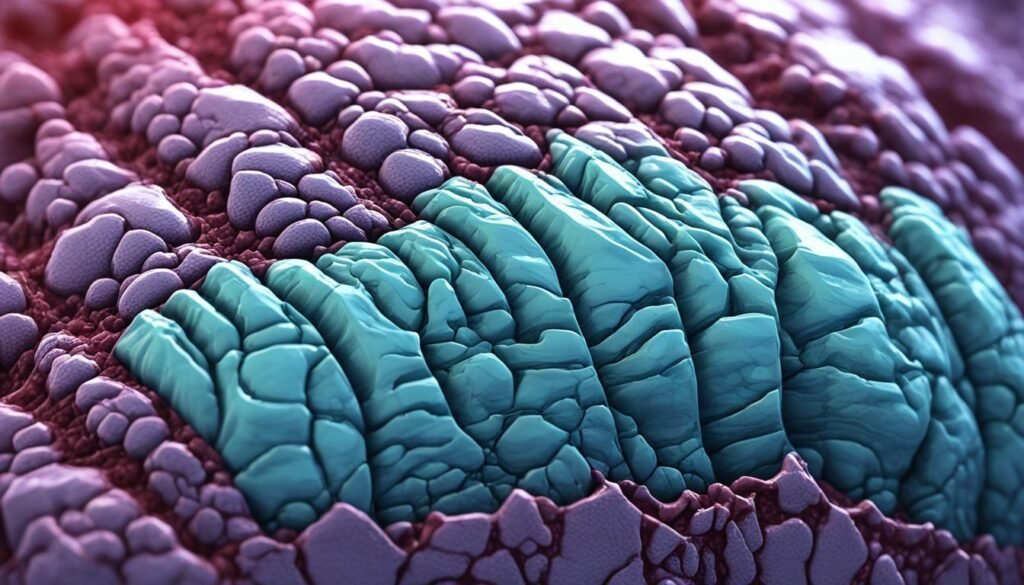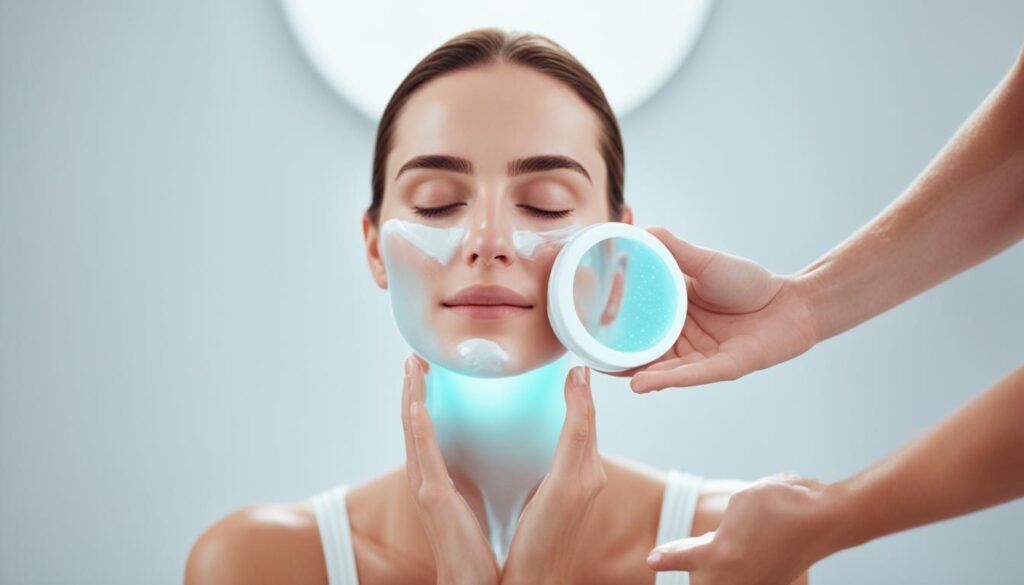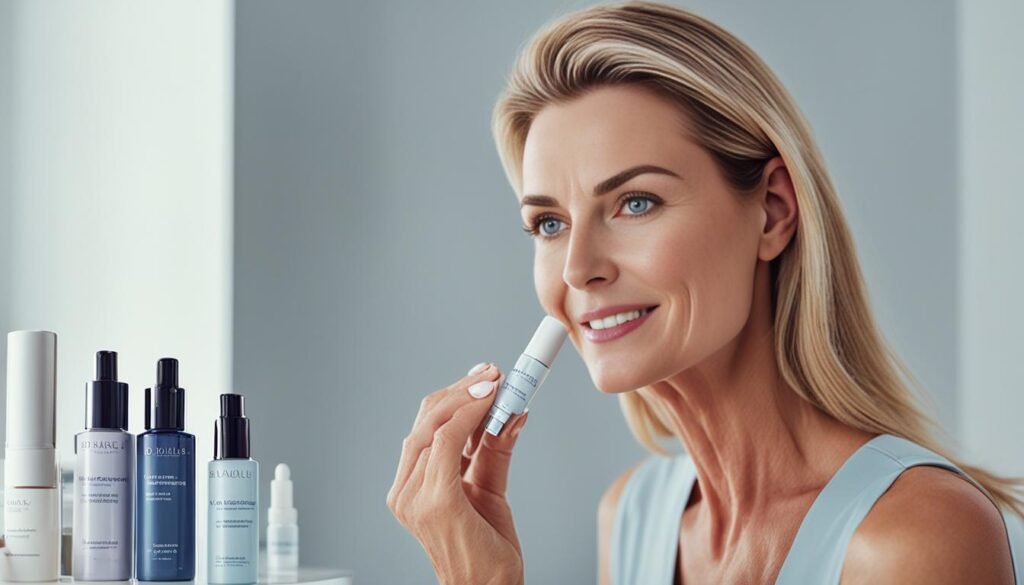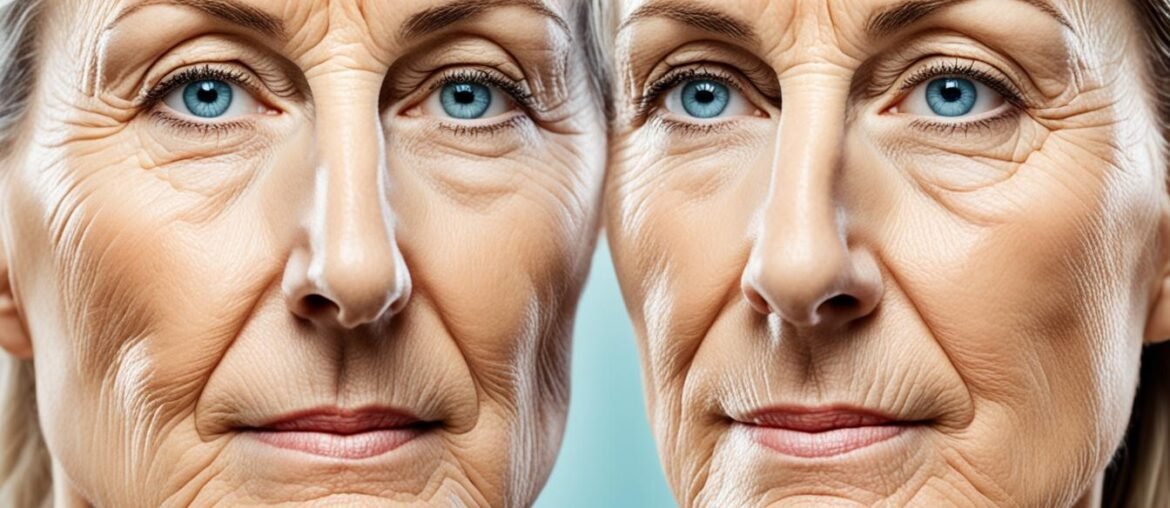Did you know that chronic stress can accelerate the aging of your skin? Multiple studies have shown that prolonged stress has a significant impact on the aging process, leading to the development of wrinkles, sagging skin, and other signs of premature aging. Stress-induced skin aging is a real phenomenon that affects countless individuals.
Whether it’s caused by work pressures, personal struggles, or the daily grind, stress can take a toll on your skin. From shortening telomeres to compromising the skin barrier, stress can trigger a chain reaction of negative effects that contribute to skin aging.
Key Takeaways:
- Chronic stress can accelerate the aging of the skin.
- Stress-induced skin aging leads to the development of wrinkles, sagging skin, and other signs of premature aging.
- Stress can have various negative effects on the skin, such as telomere shortening and compromising the skin barrier.
- Taking steps to manage stress and prioritize self-care can help minimize the impact of stress on the skin.
- Nurturing a healthy skin barrier, managing oxidative stress, and preventing glycation are important in maintaining youthful and radiant skin.
Telomere Shortening and Skin Aging
Telomeres, the protective caps at the ends of chromosomes, play a crucial role in maintaining the integrity of our genetic information during cell division. However, research has shown that telomeres can shorten over time, contributing to the aging process. Stress has been identified as one of the factors that can accelerate telomere shortening, ranking third in significance behind age and genetics.
When telomeres become shorter, the dermis, the middle layer of the skin that contains connective tissue, can start to thin. This thinning leads to a depletion of collagen and elastin fibers, which are responsible for the skin’s strength and elasticity. As a result, the skin may become saggy and wrinkle-prone, manifesting visible signs of aging.
Stress-induced telomere shortening can contribute to dermis thinning and the subsequent depletion of collagen and elastin, leading to sagging skin and the development of wrinkles.
It is worth noting that telomere shortening not only affects the skin but also has implications for overall health and longevity. Research suggests that the length of telomeres is associated with various age-related diseases and premature mortality.
Understanding the Mechanism
The exact mechanisms by which stress induces telomere shortening are not fully understood. However, it is believed that chronic stress can lead to increased production of stress hormones, such as cortisol. Elevated cortisol levels have been associated with accelerated telomere shortening.
To maintain youthful and healthy skin, it is essential to manage stress effectively and adopt stress reduction techniques. By incorporating relaxation practices, fostering positive relationships, and engaging in activities that promote emotional well-being, you can help mitigate the effects of stress-induced telomere shortening.
Skin Barrier Compromise and Stress

The skin barrier serves as a vital protective shield, safeguarding the skin from toxins, allergens, and dehydration. However, when faced with emotional stress, the skin barrier’s integrity can be compromised, leading to a variety of skin concerns such as dryness, visible lines, and wrinkles.
Research has shown that stress has a direct impact on the proper functioning of the skin barrier. A study published in Nature illustrated the relationship between stress and compromised skin barrier function. This study highlighted how the skin barrier’s ability to retain moisture and keep skin hydrated is significantly hampered by emotional stress.
When the skin barrier is compromised, it becomes more susceptible to moisture loss, resulting in dry skin. Additionally, a compromised skin barrier can lead to increased transepidermal water loss (TEWL), further exacerbating dryness and contributing to the formation of visible lines and wrinkles.
“Emotional stress disrupts the skin barrier’s ability to retain moisture, leading to dryness and the formation of visible lines and wrinkles.”
It is crucial to address stress management as a part of our skincare routine to maintain a healthy skin barrier and combat dryness, visible lines, and wrinkles. Implementing stress-reducing techniques like mindfulness, meditation, and relaxation exercises can help minimize the impact of stress on the skin barrier’s functionality.
A comprehensive skincare approach that includes products designed to support the skin barrier can also be beneficial. Look for moisturizers and serums containing hydrating ingredients like hyaluronic acid, ceramides, and natural oils to help replenish and strengthen the skin barrier.
By prioritizing stress management and incorporating skincare products that support the skin barrier, you can promote healthier and more resilient skin, reducing the appearance of dryness, visible lines, and wrinkles.
Oxidative Stress and Skin Aging
Oxidative stress is a condition that occurs when the production of free radicals in the body exceeds the ability of antioxidants to neutralize them. This imbalance can have detrimental effects on our health, including the aging of our skin. Emotional stress, along with other factors such as exposure to toxins, UV radiation, smoking, poor nutrition, and excessive alcohol consumption, can contribute to oxidative stress.
When oxidative stress occurs, it can lead to the formation of pigmented spots, wrinkles, and sagging skin. Free radicals, which are highly reactive molecules, can damage important skin components such as collagen and elastin fibers. Collagen is responsible for providing firmness and elasticity to the skin, while elastin allows the skin to return to its original shape after being stretched or contracted.
Excessive free radical activity caused by oxidative stress can weaken and degrade these crucial components of the skin, resulting in sagging and the appearance of wrinkles. Additionally, oxidative stress can lead to the accumulation of pigment-producing cells called melanocytes, thereby causing the development of pigmented spots or age spots on the skin.
Oxidative stress can have a significant impact on the aging of our skin, causing sagging, wrinkles, and the formation of pigmented spots.
To counteract the effects of oxidative stress on the skin, it is important to incorporate antioxidants into our skincare routine and maintain a healthy lifestyle. Antioxidants help neutralize free radicals, reducing their damaging effects on the skin.
Antioxidants for Skin Health
There are various antioxidants that can benefit the skin and help combat oxidative stress. Vitamin C, for example, is a powerful antioxidant that not only neutralizes free radicals but also stimulates collagen production, promoting skin elasticity. Vitamin E is another antioxidant that protects skin cells from damage caused by free radicals.
Incorporating antioxidant-rich skincare products into your routine, such as serums or moisturizers containing vitamin C or vitamin E, can help protect the skin from the effects of oxidative stress. Additionally, consuming a diet rich in antioxidants, including fruits, vegetables, and nuts, can provide further support for overall skin health.
Remember, preventing oxidative stress and maintaining healthy skin requires a holistic approach. It is crucial to manage stress, avoid exposure to harmful environmental factors, and follow a well-balanced diet that is rich in antioxidants.
Foods Rich in Antioxidants
| Fruits | Vegetables | Nuts |
|---|---|---|
| Blueberries | Spinach | Almonds |
| Strawberries | Kale | Walnuts |
| Oranges | Broccoli | Pecans |
Glycation and Stress

Glycation is a process in which sugar molecules in the bloodstream bond with proteins, such as collagen, in the skin. This process slowly rearranges the structure of the skin, causing a loss of elasticity and promoting the appearance of aging.
Stress contributes to glycation by triggering the release of cortisol, a hormone that stimulates the release of sugar and fat into the bloodstream for extra energy. The increased levels of sugar molecules in the blood make them more susceptible to glycation, further affecting skin health.
Glycation can have a significant impact on skin elasticity, leading to the formation of wrinkles and sagging skin. The structural changes caused by glycation also interfere with the proper functioning of the skin, making it more vulnerable to damage from external factors.
Research has shown that chronic stress can accelerate the process of glycation in the skin, contributing to the development of premature aging signs.
To minimize glycation and its effects on the skin, it is important to manage stress levels and adopt a healthy lifestyle. The following strategies can help:
- Engage in stress-reducing activities such as meditation, deep breathing, and yoga.
- Get regular exercise to promote overall well-being and reduce stress.
- Follow a balanced diet that includes minimal intake of sugary foods and beverages.
- Consider incorporating skincare products that contain anti-glycation ingredients, such as aminoguanidine or niacinamide.
By addressing stress and its impact on glycation, you can support healthier skin and maintain its elasticity and youthful appearance.
Controlling Stress-Related Skin Aging
While stress is an inevitable part of life, there are steps you can take to control its impact on your skin. Effective stress management techniques, such as engaging in hobbies or meditation, can help reduce stress levels.
Adopting a skin-friendly diet that includes limited sugar intake and increased consumption of antioxidant-rich fruits and vegetables can also support skin health. These foods provide essential nutrients and antioxidants that help nourish the skin from within. Incorporating foods like blueberries, spinach, and salmon into your diet can help combat the negative effects of stress on the skin.
Protecting your skin from the sun’s harmful UV rays is crucial in preventing skin damage and premature aging. Make sure to use a broad-spectrum sunscreen with at least SPF 30, wear protective clothing, and seek shade during peak sun hours. This will help safeguard your skin from the harmful effects of UV radiation.
Regular exercise not only helps manage stress but also improves circulation, promoting a healthy and glowing complexion. Engaging in activities like brisk walking, yoga, or swimming can help relieve stress, increase blood flow to the skin, and stimulate the production of collagen, which maintains skin elasticity.
Collaborating with a primary care physician can provide you with further guidance and support in developing a comprehensive stress management plan. They can evaluate your overall health, help identify any underlying medical conditions, and recommend specific strategies or therapies to address stress-related concerns.
Stress-Relief Strategies to Enhance Skin Health:
- Engage in stress management techniques, such as meditation or deep breathing exercises.
- Adopt a skin-friendly diet rich in antioxidant-packed fruits and vegetables.
- Protect your skin with sunscreen, hats, sunglasses, and sun-protective clothing.
- Incorporate regular exercise into your routine to manage stress and improve circulation.
- Consult with a primary care physician for personalized stress management guidance.
The Importance of Telomere Lengthening

While stress can lead to telomere shortening, there are lifestyle factors and stress reduction techniques that can promote telomere lengthening. Engaging in regular exercise, getting adequate sleep, eating a balanced diet, and practicing relaxation techniques like meditation and deep breathing have all been linked to telomere lengthening. These strategies help combat the negative effects of stress on telomeres and promote healthy aging.
Lifestyle Factors for Telomere Lengthening
Several lifestyle factors have been shown to promote telomere lengthening, contributing to healthy aging. Incorporating these habits into your daily routine can help protect and maintain the integrity of your telomeres:
- Regular Exercise: Engaging in physical activity, such as aerobic exercise or strength training, has been associated with longer telomeres. Aim for at least 150 minutes of moderate-intensity exercise or 75 minutes of vigorous-intensity exercise each week.
- Adequate Sleep: Getting enough quality sleep is crucial for telomere maintenance. Aim for 7-9 hours of uninterrupted sleep per night to support the lengthening of your telomeres.
- Balanced Diet: Consuming a nutrient-rich diet that includes fruits, vegetables, whole grains, lean proteins, and healthy fats provides essential vitamins, minerals, and antioxidants that support telomere health.
- Stress Reduction Techniques: Chronic stress can accelerate telomere shortening, while stress reduction techniques like meditation, deep breathing, and mindfulness have been shown to promote telomere lengthening. Practice these techniques regularly to manage stress levels effectively.
By prioritizing these lifestyle factors, you can support the lengthening of your telomeres and promote healthy aging.
| Lifestyle Factors | Effect on Telomere Lengthening |
|---|---|
| Regular Exercise | Linked to longer telomeres |
| Adequate Sleep | Supports telomere maintenance |
| Balanced Diet | Provides essential nutrients for telomere health |
| Stress Reduction Techniques | Promote telomere lengthening by managing stress |
By incorporating these lifestyle factors into your daily routine, you can take proactive steps towards promoting telomere lengthening and healthy aging. Remember to consult with your healthcare professional for personalized guidance and recommendations.
Nurturing a Healthy Skin Barrier

To nurture a healthy skin barrier, it is important to maintain a gentle skincare routine. Gentle skincare practices promote skin barrier maintenance by avoiding harsh cleansers and opting for mild, hydrating formulations instead. Harsh cleansers can strip the skin of its natural oils, disrupting the delicate balance and compromising the skin barrier’s ability to retain moisture. In contrast, gentle cleansers effectively remove impurities while minimizing irritation and dryness.
Moisturization plays a crucial role in keeping the skin barrier hydrated and preventing water loss. Incorporating a moisturizer into your skincare routine is essential for maintaining a healthy skin barrier. Look for moisturizers that contain hydrating ingredients like hyaluronic acid and ceramides. Hyaluronic acid attracts and retains moisture, while ceramides form a protective barrier that helps prevent water loss and strengthens the skin’s natural defenses.
Beyond skincare products, protecting the skin from environmental stressors is another key aspect of maintaining a healthy skin barrier. Harsh weather conditions, such as extreme cold or dry air, can disrupt the skin barrier’s function and lead to dryness and irritation. Similarly, exposure to pollution can increase oxidative stress and compromise the skin’s protective barrier. Taking steps to shield the skin from these stressors, such as wearing appropriate clothing and applying a barrier cream, can help preserve the integrity of the skin barrier.
Overall, nurturing a healthy skin barrier involves a combination of a gentle skincare routine, moisturization, and protection against environmental stressors. By prioritizing these practices, you can support the optimal functioning of your skin barrier and maintain a hydrated, resilient complexion.
| Gentle Skincare Routine | Moisturization | Protection from Environmental Stressors |
|---|---|---|
|
|
|
Managing Oxidative Stress in the Skin

When it comes to maintaining the health and vitality of your skin, managing oxidative stress is crucial. Oxidative stress occurs when there is an imbalance between the production of harmful free radicals and the body’s ability to neutralize them with antioxidants. This imbalance can lead to various skin issues, including sagging, wrinkles, and pigmented spots.
To effectively manage oxidative stress in the skin, incorporating antioxidants into your skincare routine is essential. Antioxidants help neutralize free radicals and protect the skin from their damaging effects. Look for skincare products that contain antioxidants like vitamin C, vitamin E, and green tea extract. These powerful ingredients can help reduce the signs of oxidative stress and promote a healthier complexion.
Additionally, incorporating antioxidant-rich foods into your diet can further support managing oxidative stress from within. Foods such as berries, leafy greens, and nuts are packed with dietary antioxidants that can provide extra protection for your skin. By nourishing your body with these nutrient-rich foods, you can enhance the overall health of your skin.
In addition to skincare products and dietary choices, certain lifestyle changes can also contribute to decreasing oxidative stress levels. Quitting smoking and reducing alcohol consumption can significantly reduce the production of free radicals in the body and improve skin health. Making these lifestyle changes not only benefits your skin but also promotes a healthier overall well-being.
By implementing antioxidant-rich skincare products, incorporating dietary antioxidants, and making lifestyle changes, you can effectively manage oxidative stress in your skin. This proactive approach will help minimize the signs of aging and promote a youthful and radiant complexion.
The Benefits of Antioxidants in Skincare:
- Neutralize harmful free radicals
- Reduce the signs of oxidative stress
- Protect the skin from environmental damage
- Promote a youthful and radiant complexion
“Incorporating antioxidants into your skincare routine can help combat oxidative stress and rejuvenate your skin.” – Dr. Emily Johnson, Dermatologist
Preventing Glycation in the Skin

Glycation is a process that can negatively impact the health and appearance of the skin, leading to premature aging. To prevent glycation and maintain youthful-looking skin, it’s important to focus on minimizing sugar intake and maintaining a balanced diet. Opting for low-glycemic index foods can help regulate blood sugar levels and reduce the risk of glycation. These foods include whole grains, lean proteins such as fish and poultry, and plenty of fruits and vegetables.
By limiting the consumption of sugary drinks and processed foods, you can also decrease the amount of sugar circulating in your bloodstream, further reducing the risk of glycation. Making these dietary changes can have a positive impact on your skin’s health and overall appearance.
In addition to dietary adjustments, incorporating skincare products that contain anti-glycation ingredients into your routine can provide added protection against glycation in the skin. Ingredients such as niacinamide and aminoguanidine have been shown to help counteract the effects of glycation and promote healthier-looking skin.
To summarize, here’s a table highlighting the key points for preventing glycation in the skin:
| Prevention Strategies | Benefits |
|---|---|
| Minimize sugar intake | Reduces circulating sugar levels and lowers the risk of glycation |
| Maintain a balanced diet | Opt for low-glycemic index foods and include plenty of fruits and vegetables |
| Limit sugary drinks and processed foods | Decreases the amount of sugar in the bloodstream, further reducing glycation risk |
| Use skincare products with anti-glycation ingredients | Provides added protection against glycation in the skin |
By following these preventive measures, you can help preserve the health and youthful appearance of your skin, minimizing the effects of glycation and promoting a more vibrant complexion.
Conclusion
Chronic or prolonged stress can have a detrimental impact on skin health, leading to premature aging. However, by implementing stress management techniques and adopting a healthy lifestyle, it is possible to minimize the effects of stress on the skin. Taking steps to control stress, nurturing a healthy skin barrier, managing oxidative stress, and preventing glycation can all contribute to maintaining a youthful and radiant complexion.
By prioritizing stress management and practicing self-care, I can support both my psychological well-being and the health of my skin. It is important to find effective stress management techniques that work for me, such as engaging in hobbies I enjoy or practicing meditation. Additionally, maintaining a skin-friendly diet that includes limited sugar intake and increased consumption of antioxidant-rich fruits and vegetables can support skin health.
I should also protect my skin from the sun’s harmful UV rays through the use of sunblock, hats, sunglasses, and sun-protective clothing. Regular exercise not only helps manage stress but also improves circulation, resulting in a more youthful appearance. Working with a primary care physician can provide further guidance and support in developing a stress management plan tailored to my needs.
By taking control of stress-related skin aging through stress management and a healthy lifestyle, I can maintain healthy, youthful-looking skin and promote overall well-being.
FAQ
What is the role of stress in the skin aging process?
Stress has been found to accelerate the aging of the skin by shortening telomeres, compromising the skin barrier, increasing oxidative stress, and triggering glycation.
How does stress contribute to telomere shortening and skin aging?
Stress can accelerate telomere shortening, causing thinning of the dermis, a decrease in collagen and elastin fibers, and the development of wrinkles and sagging skin.
How does stress compromise the skin barrier and affect the skin?
Stress can interfere with the proper functioning of the skin barrier, leading to dry skin, visible lines, and wrinkles.
What is the connection between stress and oxidative stress in the skin?
Stress contributes to oxidative stress, which can result in the formation of pigmented spots, wrinkles, and sagging skin.
How does stress trigger glycation and affect skin health?
Stress releases cortisol, a hormone that stimulates the release of sugar molecules into the bloodstream, increasing the risk of glycation and causing a loss of skin elasticity.
Effective stress management techniques, adopting a skin-friendly diet, sun protection, exercise, and working with a primary care physician can help control the impact of stress on the skin.
What lifestyle factors promote telomere lengthening and healthy aging?
Regular exercise, adequate sleep, a balanced diet, and relaxation techniques like meditation and deep breathing have all been linked to telomere lengthening and healthy aging.
How can I nurture a healthy skin barrier?
Maintaining a gentle skincare routine, using mild, hydrating products, moisturizing regularly, and protecting the skin from environmental stressors can help nurture a healthy skin barrier.
What can I do to manage oxidative stress in the skin?
Incorporating skincare products and foods rich in antioxidants, quitting smoking, reducing alcohol consumption, and practicing a healthy lifestyle can help manage oxidative stress in the skin.
How can I prevent glycation in the skin?
Minimizing sugar intake, maintaining a balanced diet, and using skincare products with anti-glycation ingredients can help prevent glycation in the skin.
What is the importance of stress management and a healthy lifestyle for skin health?
By prioritizing stress management and practicing self-care, you can minimize the effects of stress on the skin and maintain a youthful and radiant complexion.




